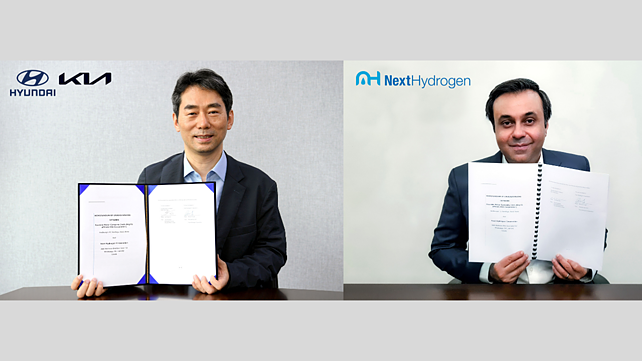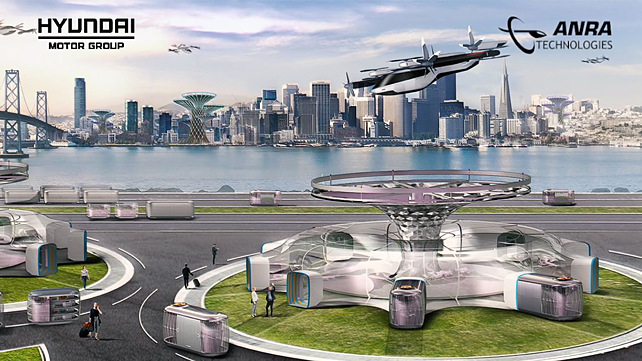
In their efforts to usher in a global hydrogen society through cost-effective production of clean hydrogen, global auto majors Kia Corporation and Hyundai Motor Company entered a new collaboration with Canadian Next Hydrogen Corporation that specialises in water electrolysis technology.
The MoU between the companies lays down the foundation for them to develop an advanced alkaline water electrolysis system, which will help produce green hydrogen economically. Producing clean hydrogen is an expensive and time consuming process. The collaboration would aim to improve the price competitiveness of clean hydrogen in consideration of regional climate and environmental characteristics.
The alkaline water electrolysis system is a hydrogen production method that electrolyses water using an alkaline electrolyte such as potassium hydroxide (KOH) or sodium hydroxide (NaOH).
While expanding their base by examining the strengths and weaknesses of various water electrolysis technologies, the companies have agreed to explore the possibility of alkaline water electrolysis system among various water electrolysis technologies.
The electrolysis system will be developed jointly, along with its related stack, said a release issued by the South Korean group. Next Hydrogen Corporation is a subsidiary of Next Hydrogen Solutions Inc.
As per the agreement, the companies aim to develop a more efficient stack for the system, and explore potential technological applications and commercial arrangements in the future. Further,
What is alkaline water electrolysis?
Among the various methods of water electrolysis, the alkaline water electrolysis system is regarded as technologically one of the most rigorously tested and proven means with a long track record of research and development, said the release. It is able to produce large-scale hydrogen using relatively inexpensive catalysts, making facility costs low.
The partners are aiming to advance stack-related technologies that are at the core of the alkaline water electrolysis system, and thus reduce the cost of building, maintaining/operating the system.
From this project, the companies are looking at enhancing the performance of stack-related technologies in the alkaline water electrolysis process, whereby it will be possible to develop a new stack that can be operated at high current density and produce green hydrogen economically.
Technology related to electrodes, bipolar plates and current collectors for the newly developed stack will be supplied by Kia and Hyundai, while Next Hydrogen will provide the design technology. The South Korean group companies will also oversee the test performance of the new stack.
The company said a pilot test is planned for next year, and that the partners will also explore potential technological applications and commercial arrangements.

Fuel of the future
Meanwhile, green hydrogen is supposedly one of the cleanest varieties of hydrogen produced, generating zero carbon emissions. This is because it is produced using water electrolysis powered by renewable energies such as offshore wind.
Green hydrogen is hailed as the “fuel of the future” for its eco-friendliness, and is believed to have the potential to revolutionise the world’s industrial and transport sectors.
Other varieties of hydrogen include ‘grey’ and ‘blue’ hydrogen, which are made with fossil fuels. While grey hydrogen emits CO2 into the air as they combust, the blue variant’s carbon-capture technologies prevent CO2 from being released into the air and instead store carbon dioxide deep underground.
Interestingly, Hyundai Motor Group had recently introduced a new brand representing the group’s world-leading hydrogen fuel cell system, called ‘HTWO’. Efforts are being made by the group to develop a next-generation hydrogen fuel cell system that can be applied to various forms of mobility such as urban air mobility (UAM), automobiles, vessels and trains and beyond.
A partnership for the future
“This partnership is another leap forward for our hydrogen business and will be our first step into the alkaline water electrolysis market,” said Jae-Hyuk Oh, Vice President and Head of Energy Business Development Group, Hyundai Motor Group. Oh said Hyundai believes its technology will be an excellent match for Next Hydrogen's technology, and this synergy will help achieve its goal to provide its customers with cost-effective green hydrogen.
Raveel Afzaal, President and CEO, Next Hydrogen said its water electrolysis stack design technology is an ideal solution for enabling economical production of green hydrogen. “This partnership is expected to accelerate efforts to address the incredible emerging opportunities in sustainable transportation globally,” he said.